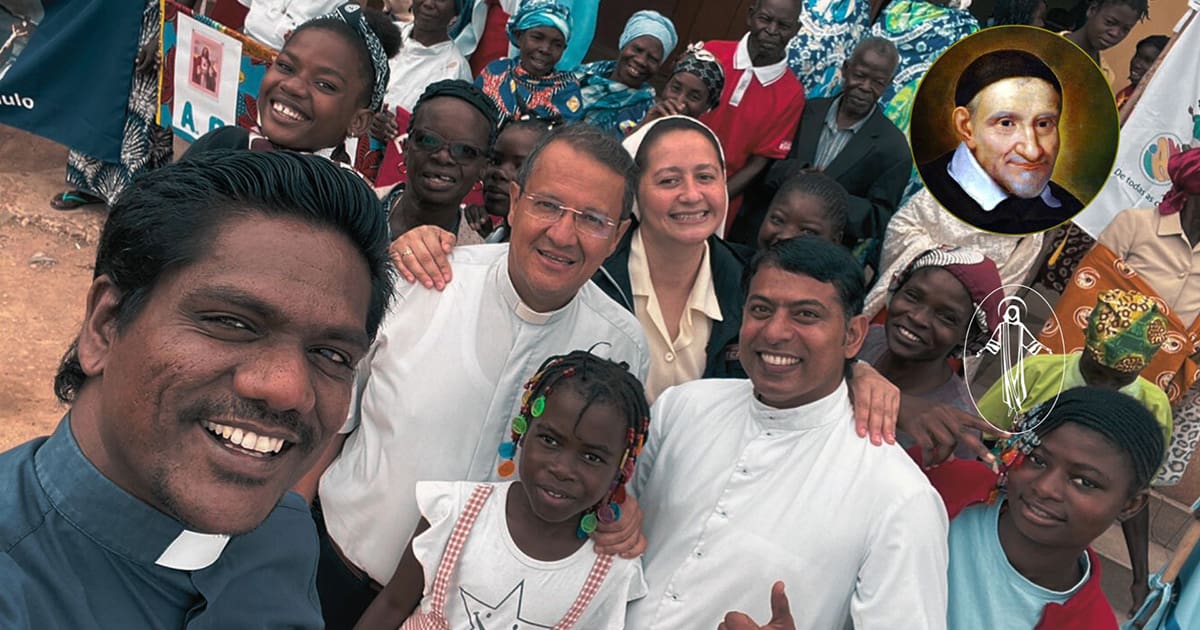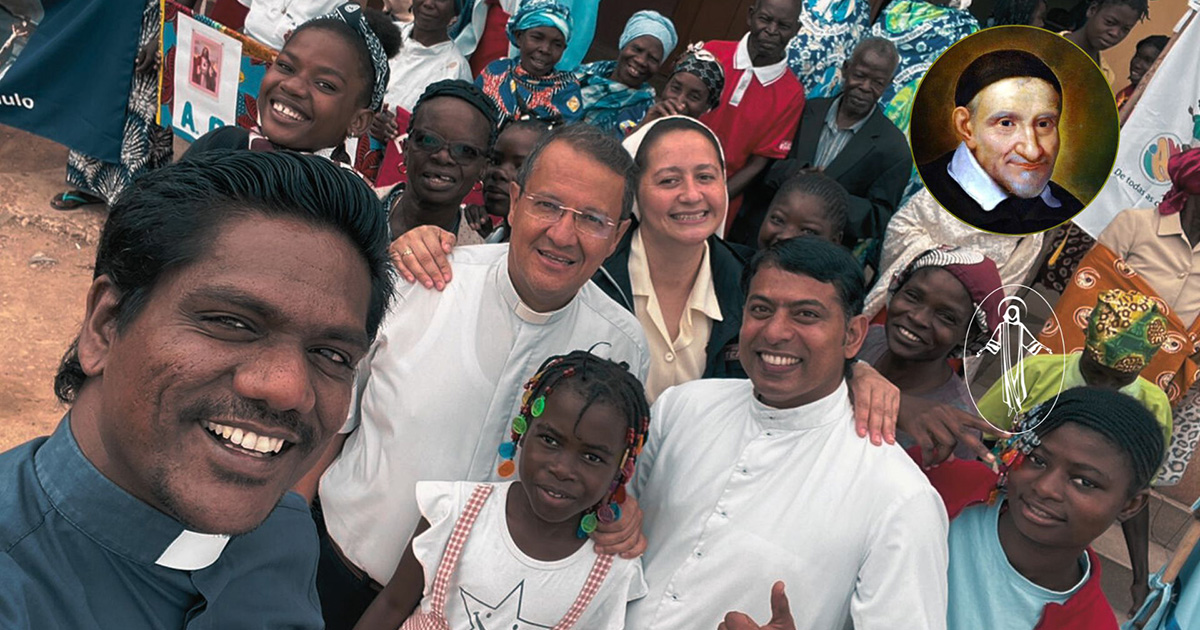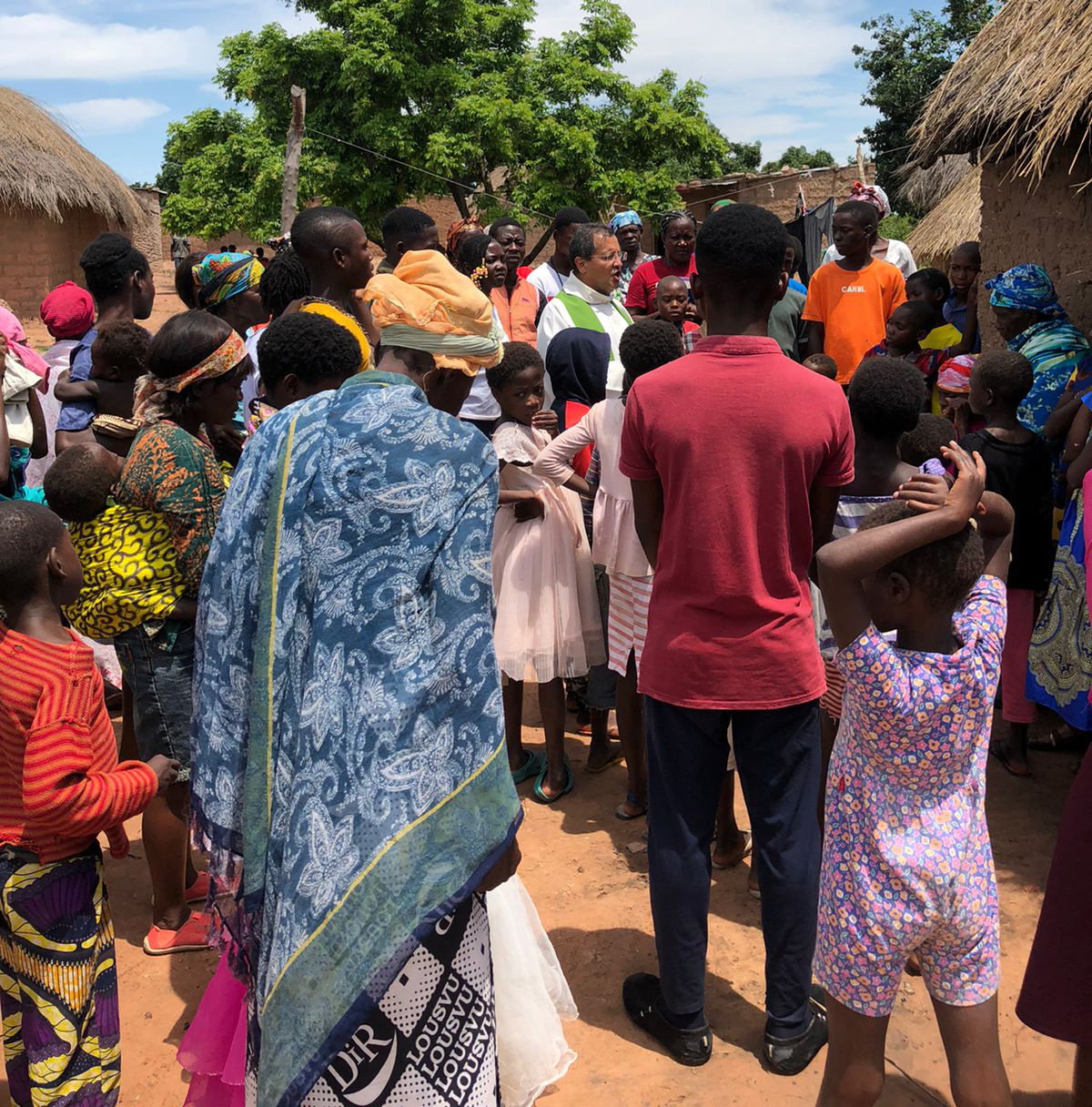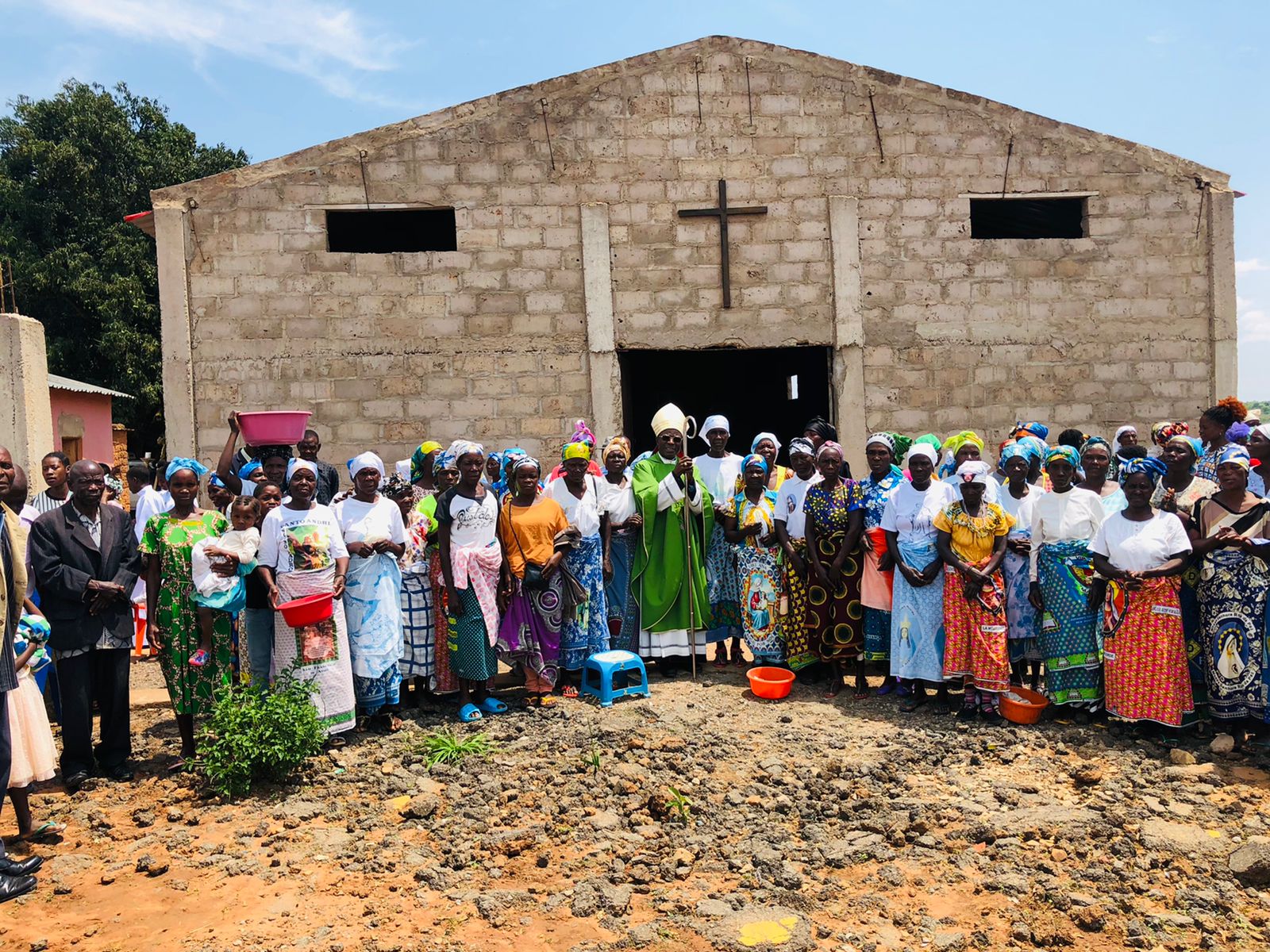Interview with Jorge Luis Rodríguez, CM, missionary in Angola
What was the decisive moment that pushed you to respond to the missionary call and how does it connect with the Pope’s invitation to “not take your eyes off the poor” (Tb 4,7)?
Before taking the decision to leave for the missions, I was serving in the Communication Office at the General Curia. This allowed me to get to know many confreres and the reality of the Congregation where we are present. The mission in Angola attracted my attention because of the difficult times it was going through. I began to read about the reality of Angola, to come into contact with the missionaries, and little by little it became a longing to be able to serve and evangelise this people so in need of the proclamation of the Gospel and of human and integral promotion; in 2018 we launched the 1% Campaign, which aimed to motivate the participation in international missions and missions in general, of 30 confreres, but not only in that small number, as well as to encourage the missionary spirit in the whole community. So, at the end of that year, I told the Superior General, Father Tomaž Mavrič, CM, that I wanted to be part of the 1% – the campaign was having an effect. I started to make preparations for the mission. There were many fears and it was going to be a radical change; to leave the security of the Curia and the comforts that a city like Rome could offer, to face a new life situation.
Tell us about the beginning of your service among the poor. What early experiences shaped your missionary approach in response to the ‘evangelical realism’ that Pope Francis speaks of?
Every beginning is complicated, especially when we have to face a new language and a new culture, and all that that entails. We arrived as a missionary team on 18 May 2022, the three confreres who make up the local community, we met at the same airport as we arrived on the same day and at almost the same time. Rony Kannaikkal, CM, from the Province of North India, Suresh Praban, CM, from the Province of South India, and the present writer, from the Province of Colombia.
The biggest difficulty we faced at the beginning was getting to know each other and how we communicated, as none of us spoke Portuguese. For the first few months, we spoke English, and after several months of Portuguese classes with a teacher from our mission school, we were able to improve our communication, even though there were moments of confusion, the people patiently did their best to understand us. The enthusiasm and joy of being in the mission and living the experience to the full, made the difficult moments become more anecdotal than difficult. One of these anecdotes happened one day when one of us was talking about a bomb, we didn’t understand if it was the water bomb or if a war had exploded; What he wanted was to ask for a sack for the “bombó”, which is the dried cassava or manioc that is then ground and with the “fuba” or flour, “funge” is made, which is one of the main dishes of Angolan gastronomy, manioc is the main product and the families offer it for sale; with its sale, we help to support the parish.
Another challenge is the knowledge of the culture and reality; on the one hand, it is a joyful people, and it expresses this through music, dance, ancestral customs, food, the more than 40 languages spoken in the different provinces, its religiosity. On the other hand, Angola is a country with a history of colonialism for many years, of slavery, of suffering and war; Angola is a country of great differences, with a wealth of natural resources, water, orography, oil production, metals and precious stones, it is classified as one of the richest countries in Africa, but this reality contrasts with an enormous scarcity that does not allow the population to escape from its poverty and in some regions, it touches misery.
Another of the great challenges that we find in Angola is witchcraft and its different manifestations, which has become a reality that we have to evangelise permanently. To talk about this subject in a paragraph is to reduce too much a subject that is part of the history of this and many other peoples of the world. One can speak of it as a practice of magic to cast an incantation on someone, which is usually negative and carries with it evil. All this reality is impregnated with lies, deceit, ignorance, a false tradition, economic and human exploitation, in which the most affected are the poor, but particularly the elderly who are accused of being feiticheros or witches and the children whose premature death is often attributed to the fault of the elders, who are the ones who supposedly carry out this practice, are often accused, punished, banished or killed by the community itself.
Can you share a particular story that illustrates your personal encounter with the poor, whom Pope Francis describes as faces and stories, and how this has influenced your service?
Life in Angola is full of beautiful encounters, where we can experience the support and generosity of the people, in the parish, the people distribute the work in groups, their participation in the liturgy, the toilets, the work and everyone does it diligently.
But there is a particular moment in which the solidarity of the African people is expressed even more, it is the moment of death. The Angolan people are very touched by death. When death knocks on a family’s door, the tradition is to watch over the deceased for four days while the body remains in the morgue, a kind of rite called “óbito”, in which the departed is mourned day and night, accompanied by prayers, songs, dances and some games. But as they have to eat, the condolences are accompanied by money or food, to support the people during these days.
Death is a step that cannot be explained, but it becomes more complex when in most cases the cause of death is unknown. I was very surprised by the death of Emanuela, a girl of about 8 years old belonging to the Missionary Childhood group of the Parish, her mother told me that that day, the girl was at school, then playing with her friends, and after dinner they were talking, then she began to change colour and began to vomit, and suddenly she died. From what? We don’t know and we will never know.
Often, people come knocking at our door, not only asking, but also sharing some part of their harvest, as well as in the villages, where they share part of their crops. All this becomes a great joy, because, in the midst of so much poverty, such gestures of generosity are doubly meritorious.
How have you experienced sharing and solidarity within your missionary community and what concrete actions have you taken to respond to the Pope’s call to share not only the superfluous?
There are many actions that we have started, but they are minimal in relation to the great challenges that poverty brings with it. With the young people of the parish groups, evangelisation plans are being carried out in the villages or neighbourhoods, and with them, during their holidays, in addition to evangelising, they have been supporting these communities in the construction of their chapels. The chapels are built with mud and straw, and are practically disposable, as many of them fall down during the winter. Already during the summer period, the youth groups have been supporting the reconstruction of the chapels in some of the villages, in many occasions, they themselves contribute, not only with their time, but also with money.
This year, in addition to this work, with young people from the different groups, a campaign was carried out for the construction of the house of an old man who was in danger of falling down during the winter.
In a few weeks, we will begin the implementation of the Pastoral de la Infancia project that seeks to accompany pregnant mothers and infants from 0 to 5 years, in their gestation and early childhood process, both in training for mothers, as well as accompanying the children and offering them some food to help solve the hunger. It is worth mentioning that the infant mortality rate is very high in Angola, therefore, with this project, we want to alleviate this situation a little.
How has your faith deepened your experience among the poor and how is this reflected in your daily living of the Vincentian charism?
One of the greatest dangers we can experience in the face of poverty is to become accustomed to it. Every day we are confronted with the different situations of the poor, hunger, malnutrition, disease and death. Every day, people of different ages come knocking at our door in need. Faced with all this, the worst thing that can happen is to get used to these situations and look on with indifference. The first few months we are very moved by the reality, but as the days go by, one can become desensitised, which is terrible, because who are we going to proclaim the Gospel to if we do not know their reality, if we do not suffer their suffering? This is a way to get us moving, to look for solutions. We will not have everything under control, and many things will remain to be solved, but we know that we have done our bit.
What resources do you need most to advance your mission and how can the community be actively involved in this process of support?
Following the example of St. Vincent, we cannot act in an improvised way or ignoring the past, this people, this mission and the particular Church itself have a history and have already come a long way. Our confreres who arrived 12 years ago gave an orientation to the mission, so we have to look ahead, recognising what has been achieved and looking for new ways and alternatives.
Faced with the needs, of which there are many, I think that one strategy and one response is to implement projects based on systemic change, which really seeks to promote actions that respond to the roots of the different realities of poverty.
I believe that the Congregation is already giving its support, in September we had the visit of the Superior General, Father Tomaž Mavrič, CM, who got to know the reality of the situation and offered us guidance on how to move forward. Similarly, the Assistant General, Father Nelio Pita, CM, has always been in contact with us, accompanying and guiding our work in the Mission.
Have you ever experienced fear in your missionary service? How have you dealt with these fears in the light of the Pope’s encouragement to keep your eyes fixed on the poor?
I think the fear we experience most is of illness, especially typhoid fever and malaria, because it weakens us a lot, but as the people here do, the important thing is to detect it, take the right medication and rest so that the medicine can work and move on. One advantage is that we have the possibility to go to the doctor, to have a medical examination, to buy medicines, the common people do not have this “advantage”, so, as I said before, we cannot ignore this reality.
Could you share a moment when you clearly felt the presence of God in your work with the poor, in line with the Pope’s invitation to see the face of Christ in the less fortunate?
We feel the presence of God every day, the encounter with the poor is in reality a permanent encounter with the Lord, in the streets of our town, in the visits to the villages, in the meetings with the communities, in the formations, in the meetings with the groups, at every moment we feel this presence that encourages and strengthens us to go forward.
What would you say to a confrere who is considering missionary life? What words of inspiration would you draw from the Pope’s message to inspire him to ‘not take his eyes off the poor’?
Let Pope Francis answer this question and inspire many confreres to speak out about the missionary call of the Church and the CM at this time: “It is easy, when speaking of the poor, to fall into rhetoric. It is also an insidious temptation to remain in statistics and numbers. The poor are people, they have faces, stories, hearts and souls. They are brothers and sisters with their qualities and faults, like everyone else, and it is important to enter into a personal relationship with each of them”. Let’s go on mission!
Jorge Luis Rodríguez, CM
International Mission of Angola
Superior
Source: https://cmglobal.org/
Tags:











0 Comments